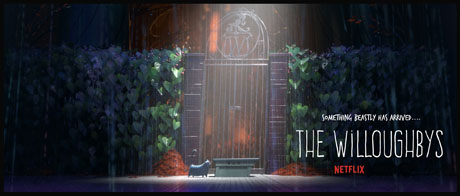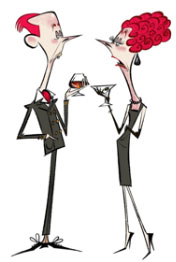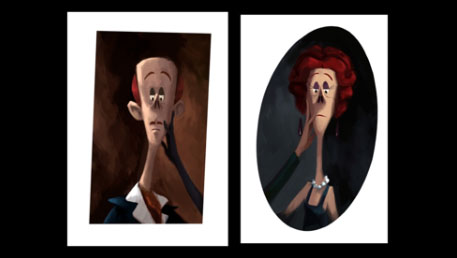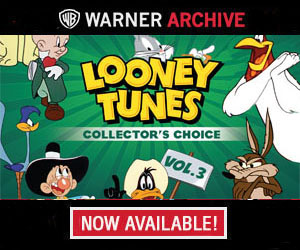
Animation director Kris Pearn pitched an adaptation to the Lois Lowry novel “The Willoughbys” for 3-4 years – he knows the characters and story well. But could he have predicted that this madcap inverted world of detachment and isolation would run a whimsical parallel in our own pandemic?
As our world stood still so did the well-earned celebrity red carpet fanfare that should have accompanied the premiere of this film starring Martin Short, Maya Rudolph and introducing us to the multi talent of Canadian star Alessia Cara. However, the eyes of a much broader based audience may have been reached as families sheltered in place hoping for normalcy amidst the chaos – a stark resemblance to the film itself.

This film speaks to every age level comedically addressing adult themes of codependency, social immobility and the absurdity of a fixed mindset while creating dialogue and visual context to multi-layered cross generational topics relevant to our current climate. As we grow along with these children attempting to find themselves in an abusive family dynamic (that’s putting it mildly) we are introduced to relevant subjects such as gender identity, feminism and the war between toxic masculinity vs diversity and change. This film teaches us that if you listen hard enough you can find your own voice despite your learned behaviors.

Art by Craig Kellman
With a 90% fresh rating on Rotten Tomatoes and watched by 37.6 million households in its first month on Netflix, I decided to investigate a little further with Pearn about what he thinks makes this movie reverberate.
Aubry Mintz (AM): What do you attribute the great success of this film so far? Do you think people being at home helped in this regard?
Kris Pearn (KP): I definitely think we got a Corona-bump. Not that we take any joy in that – I don’t think there was anything good about this virus spreading across the world. A funny movie at this particular time found an audience. I think it was a needed time for the audience to get a little bit of comedic release. There were some themes in the movie that dovetailed interestingly into what was happening in the world. This idea of family stuck together. It was nothing that we planned
AM: Families stuck together, but also families being torn apart. It was interest to see a movie about being orphaned – which you handled in a wonderfully sensitive and comedic way – I don’t think your poking fun of orphans – did you receive any feedback in this regard?
KP: On our journey we did –One of the key things to balance the tone was a lot of trial and error. There was a lot we had to do to be sensitive to calibrate all of those issues. We were taking this notion from Lois Lawry’s book – this subversive poking fun of children’s literature, and pivot over to family movies. But within that you want to make sure you’re not hitting too close to someone’s real knuckle. We wanted to be sensitive to that reality. So, letting characters off the hook. To some extent even the parents – I really love the idea that they were stuck in a state of their own arrested development.

AM: You were talking about the parents and you created this wonderful balance of making them really horrible people yet they needed to be redeeming enough that we felt OK that Tim (and siblings) were going to the highest mountain to save them.

Early Tim by Kyle McQueen
AM: I imagine it’s as a fine line with the amount of abuse the parents were giving down to the kids. Was there any point where you wondered if people were going to laugh at this pretty horrible stuff?
KP: We had a whole backstory on what the parents were like. You have to imagine – “how did they get here?” They obviously don’t have much in the way of sex education. They were childish people. The animators made them point more than they should – like the way children point in school yards. They were always in the middle of throwing a tantrum. Mom always felt like she was the victim. All of these choices were made to pivot off the abuse to make it seem like they had a point of view. Even though it made no real sense.

Jane – by Craig Kellman

Twins are creepy – by Craig Kellman
AM: The animators found something special to do for every character and moment. i.e. the way Martin Shorts character crawls on the floor like a worm and had a dolphin sound. What drove the decision on how to make these frantic choices?
KP: We leaned harder on pose to pose animation and we would make choices based on the subtext of the characters. We talked a lot about Tim being a character that shot up in the last 6 months – his legs came out of the pants at the bottom. He probably only had one pair of trousers his whole life. That “Faulty Towers” John Cleese thing where no matter how stoic he behaves he’s always one inch from falling down the stairs. The adolescent hubris against the awkwardness of his own physicality felt really funny. We wanted to contrast that with Jane who was a musical character – she has sentimentality in her – she never cut her hair – and she’s weightless. I don’t know if you’ve ever held a chicken (Author’s note: Kris lives on a farm) but they have no weight in their bones – I wanted Jane to have that feeling
AM: Like she’s elevated

Cold Reunion
And the twins they didn’t move much so they became these fenceposts that hold down compositions. The father doing the worm – that was one of the first things we animated and people wondered if we went too far – like was it too cartoony? Because mom and dad were broad it held OK.
AM: I think it also pushed the idea that they never left the house and they didn’t know how to act?
KP: Yeah, I loved the idea how panicked they get. Like turkeys (Author’s note: like I said … farm) – who fly ten feet from perceived danger and then they are fine. The parents freak out at a new idea then once it settles, they become curious.
That notion of them representing the colonial attitude representing the first reaction is fear the second reaction is “can I own it”? That was their MO through the film. It just plays that they are children that never grew up even though they are old and have kids. Ultimately that’s what happens when you step out of your own comfort zone.
AM: Yeah but it helps because if Tim wants to restore the family so badly and these parents are being so selfish, they are not thinking past themselves –

Love Hurts by Robin Joseph
KP: In this film the notion was you can’t build a wall to keep ideas out – eventually walls fail and ideas (good bad or ugly) have to be dealt with. And what makes a family great is not about the blood/genes/color of hair or even really what you do – it’s really what you choose to love and how you choose to empathize and care for other people. It’s about listening. Everything needs to change in order to stay the same. The only thing consistent is change and this family tried to stop changing. And that was their mistake. The movie wants them to heal that. Ultimately their redemption of the parents was not the movies goal. It was giving the kids new ideas so that THEY could change what it meant to be a Willoughby.
AM: And Jane had that idea the whole time. Their suppression of her, and Tim echoes this. But even though it was Tim’s story – told through his eyes, but Jane was the main character in some ways. She needed to find her song – she always had her song – even toward the end when they were going to die. She stays optimistic and shines her light – cause that is what she has – allowing Tim to come back to her – which was a great moment because Tim was still going after the thread – he was grasping at anything to keep the family thread together -but it was Janes song that brought him away form that saying “no we are OK here”
KP: Tim and Jane had to realize their family was not good. Jane was looking towards the future and Tim was looking towards the past. Which is common in politics, families, institutions, etc. there’s people that want the good old days and people that want something new. Quite often the answer is a bit of both. The thread represented a connection to the past that Tim is chasing. But the thread doesn’t matter because the connection is the humans. Ultimately Jane being sentimental and saying “I chose you” – she’s not saying goodbye to this family – she’s not choosing what it means to be a Willoughby – she’s choosing the people that she grew up with. It’s a hard lesson to do in life but its real. And the twins are the “now” – in some ways they are the most Zen people in the story. So, we have the past, future and present all having a place in saving the film.

Before Jane had a voice – Kyle Mcqueen
AM: it wasn’t like an anti-musical – it was a movie that wanted to be a musical – but maybe it was suppressed and fought the movie itself (like from the family’s suppression maybe) and it couldn’t be a musical.
KP: we wanted to make fun of family films. In your average Disney film where everyone sings along and is so happy the character is singing. In this case – what if no one was happy you were singing – you kept trying to make it a musical but no one wanted it.
AM: it was such a touching moment when Jane sings “I Choose” because it made you really want to hear the song. And it was such a great release when you finally did. For even people that don’t like musicals they would probably want to hear the song.
KP: I wasn’t sure if the joke would survive – in the first 5 minutes of the movie the father tells the child to shut up – the dad was so mad off camera that she was singing – I don’t know how he heard it – but that puts you in her court. It makes you root for her to get the song done. Then when nanny shows up, she helps her with the song. Nanny represents the ideal what a parent should be – open minded and is able to listen. She’s the first person that listens in the movie. That’s what gives Jane the courage to take it to the end – Jane can’t finish the song until it really matters. That’s Jane growing up.

Nanny – new shapes
AM: Tim was a kid trying to grow up despite his parents. Trying to unlearn what his parents taught him. The idea of having learned behaviors and what it’s done to society – racism, political opinions etc. The film is teaching you to go deeper past what is familiar and negative, and pull out what is truly you.
KP: And that’s the hopeful thing about ideas – and change and empathy – patterns can be broken and loops don’t have to loop. There are opportunities for evolution. It’s easy for me to talk about this as a hopeful thing – its harder to walk it through the world and be part of that conversation. We were making this movie and always mindful of it and then the world changed.
My daughter went to the protests here in London (Ontario). Their consciousness of what needs to change is coming from a place that keeps them hopeful. It’s not necessarily what the movie is trying to do but it’s not shying away from that optimism. If the generations can learn to love each other than the world can be a better place.
AM: And it doesn’t hurt that the hero’s in this film are diverse – Mellanoff and the Nanny are black – Jane has progressive yet masculine qualities and Tim more conservative yet feminine
KP: we tried to create the family as very homogeneous. And everyone that they come in contact with, the baby, the cat, the nanny, Mellanoff – they are all different – shapes, movement, tones, color, – that’s what I wanted to talk about. When you look at a city like Toronto, NY etc. – the strength of those places is the flavor. You can choose to break a cycle, you can choose your family, you can choose to be open minded and find your way.

Harness the rainbow
AM: I want to talk more about the yarn – it almost had a Lynch-esque quality to it – when the mother cuts off the father’s moustache. It was just so odd and interesting but it worked. Was the mother trying to keep it all to herself – keeping the pride family to herself?
KM: It was a resource thing – mom is harvesting dads’ mustache to make yarn. Father is somewhat repressed because he’s serving her. Which isn’t a bad thing – it’s like one of the domino chips towards evolution closer to the mark – but then you’re making all sorts of mistakes. I do love the fact that the father was kind of like a feminist. He was subservient to the woman of his dreams. There was something noble about that. I also love the graphic – moustache representing manhood/masculinity/dominance of the planet. There’s a toxic masculinity that then moustache represents. Which is a great contrast with the rainbow which represents diversity and change. Ultimately those two things are at war in the movie. So, the fact that father has a diminished moustache we had to somehow explain that’s where mom gets her yarn from.

Toxic Masculinity by Kyle Mcqueen
AM: LGBTQ conversation continues when we see at the end that Jane is the one that grows the moustache. In think it works tremendously well representing the non-binary, trans community.
KP: My youngest daughter made me sensitive to this and brought to light how you might approach this topic. there’s also no proof that Tim is actually a boy. That could be in the sequel – we could figure that out. I do love the idea that you are what you choose to be.
AM: Mellanoff feels like the antithesis of the Willoughby’s story – they start in a similar way – they are both shut ins and live in these houses stuck in between two spaces. However, unlike the Willoughby’s he learns to let people in after meeting Ruth, he grows fonder of their childish needs, wants her to stay etc. So, it’s an example of what the Willoughby parents could have become if they listened to their kids.
KP: Yeah kind of like the Ghost of Christmas future but positive.

Early Melanoff by Kyle Mcqueen
AM: Yeah super positive. He also has amazingly unique colors and shapes. Sometimes you’ll see more risk taking in vis dev that doesn’t quite make it to the final design. What did you do – were there any risks you had to fight for to keep him so unique?
KP: Kyle McQueen, our production designer, helped make the parallel between the two families; the Willoughby’s house was very organic – animals heads, trees etc. Whereas Mellanoff’s factory is very clean, austere, and industrial in that practice way – yet inside of all of the machines is candy – on the cold conveyor belt is color. Even though the house is brightly colored, its sandwiched between two concrete pillars. Yes, it mirrors the Willoughby’s house but it also represents that Mellanoff has good inside of him but you have to get through the wall to find it.
You have a son; I have a daughters- one of the things about being a parent is you notice how much your kids watch you – and how you teach your kids subliminally without knowing your doing it. What I loved was that the kids were gobsmacked – not just because of what was going on in the factory but because they were watching how these two adults behaved around trying to save this kid. Actually, Maya Rudolph ad-libbed that whole long speech she gives in the factory where she talks about Ruth and saying that she could be anything – she could grow up and be president. I kind of teared up when she did it. The kids are watching this adult say that this baby has potential – nobody said it about them. The kids had to see someone do it right so that they knew that was a way forward.
AM: They showed them successful parenting.

Early Factory

Early House by Pete Oswald
Kris Pearn was born and raised in Canada. After graduating from Sheridan College, Kris has spent most of his life making cartoons for both film and television. His credits include: Open Season, Surf’s Up, Arthur Christmas, Shawn the Sheep, Pirates: Band of Misfits, and Home to name a few. He was Head of Story on Cloudy With A Chance of Meatballs, and co-directed Cloudy Two: Rise of the Leftovers. He has most recently written and directed the Netflix animated feature THE WILLOUGHBYS based on the novel by Lois Lowry. Kris has been nominated for several Annies, has taught at Sheridan College, lectures all over the world through Schoolism, and has given a Ted Talk called “The Optimistic Opportunity of Failure”. He has illustrated several books including: Edward The Tree Climbing Dog, Project Superhero, and Tales of Spiffing. He still loves to draw.
- The Willoughbys: Shockingly Prophetic and Oh So Relevant - July 10, 2020
- “Gun Shop” / “Candy Shop” – Patrick Smith Copes with Subliminal Transgressions - December 9, 2019


 July 10th, 2020
July 10th, 2020  Aubry J. Mintz
Aubry J. Mintz  Posted in
Posted in  Tags:
Tags: 






